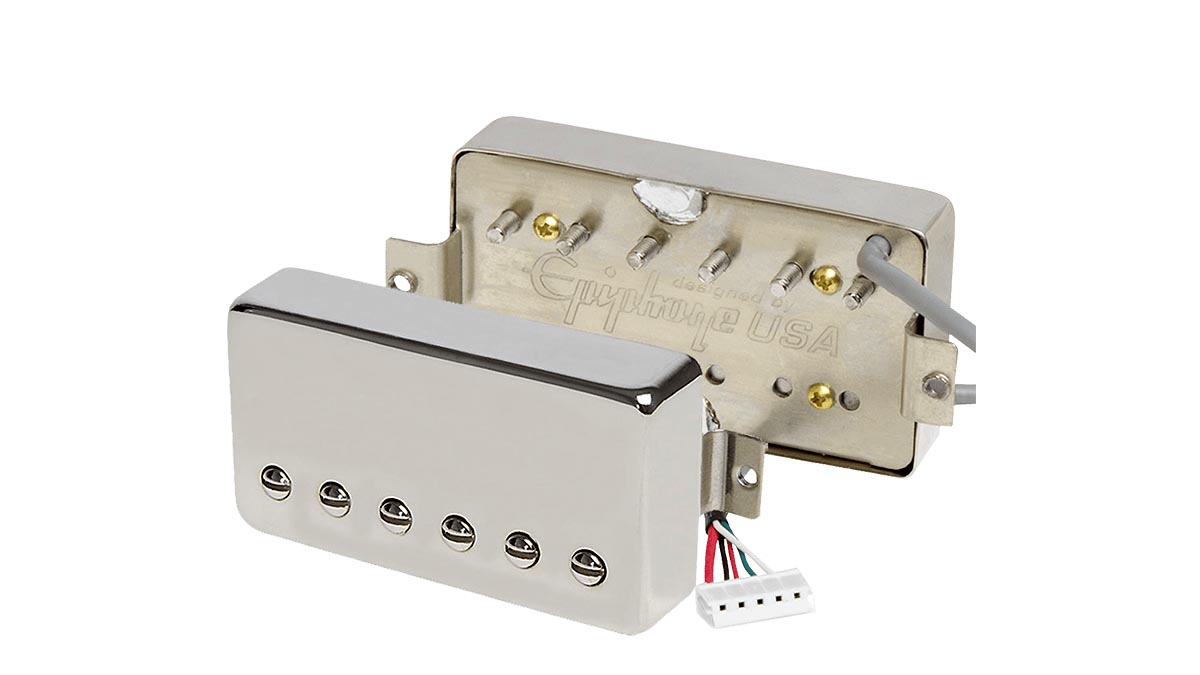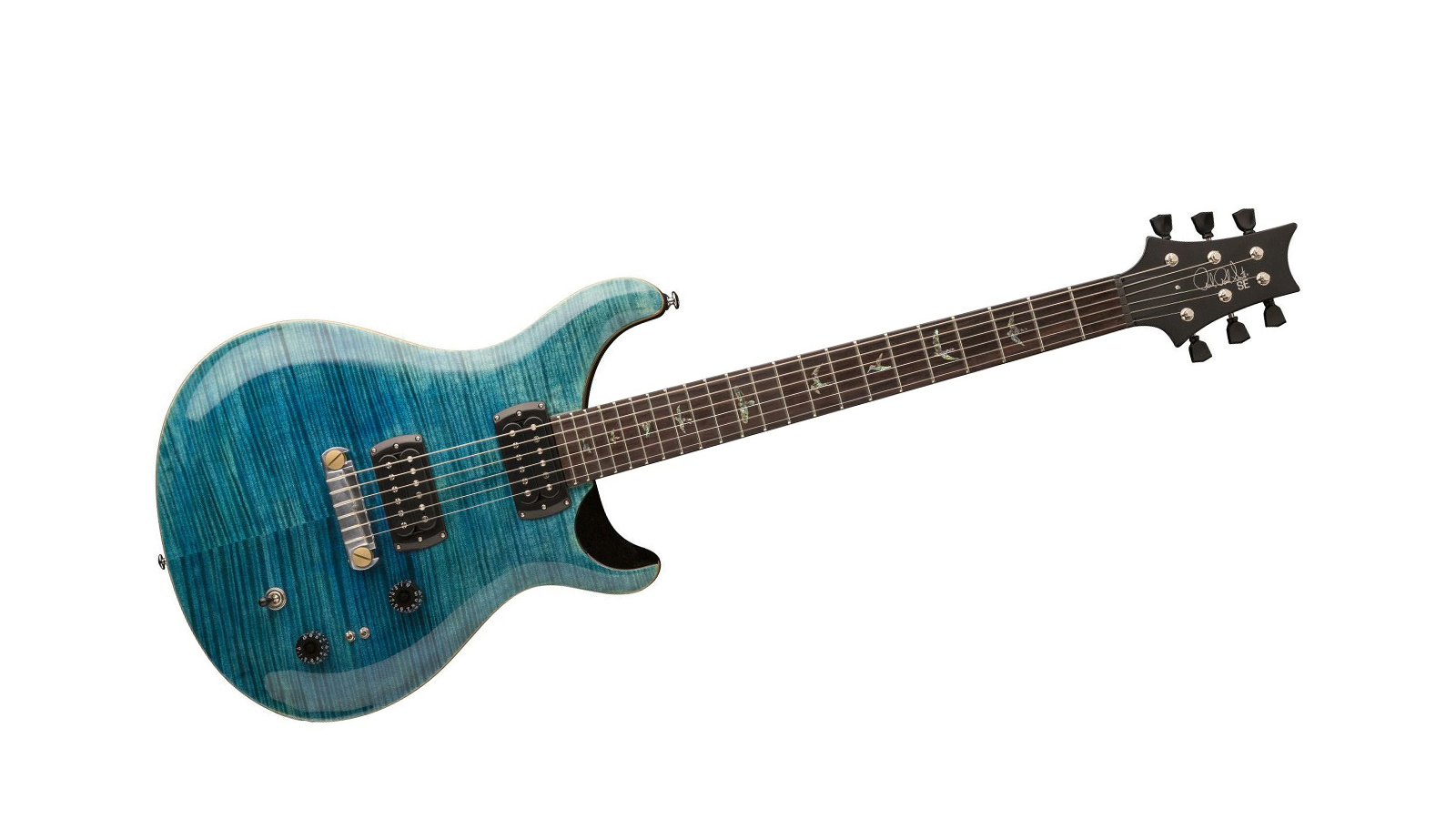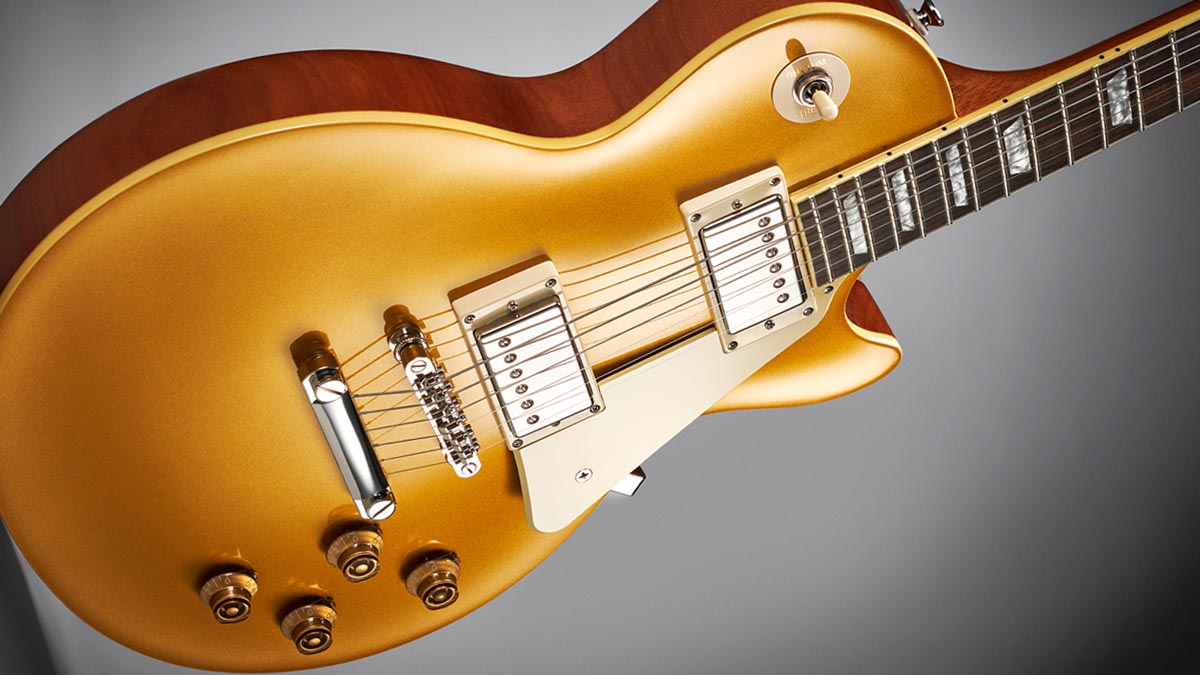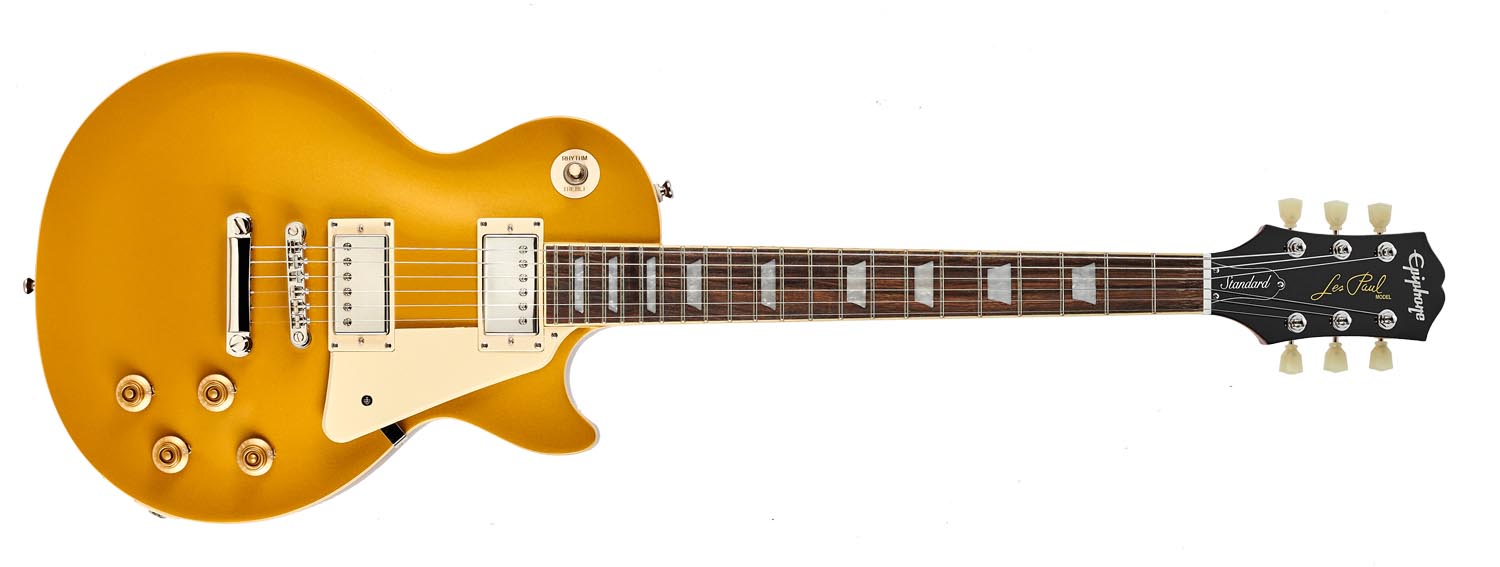MusicRadar Verdict
Epiphone gets the details right on this 50s Les Paul Standard. The tones sound authentically vintage. The feel and weight is right. And all this at a price that is impossible to argue with.
Pros
- +
Epic sustain.
- +
Those ProBucker pickups are very well voiced.
- +
Vintage-correct long neck tenon.
- +
Nice finish.
- +
Great value.
Cons
- -
It's heavy.
MusicRadar's got your back
What is it?
This year has seen Epiphone split its lineup into the Original Collection, which celebrates its own heritage, and the Inspired By Gibson line, which offers a more affordable take on the best-loved acoustic and electric guitar designs of its parent company, Gibson
And it has been quite the year: quality has increased across the board, with high-end product lines such as the metal-orientated Prophecy Series pushing the envelope, with spec and build quality that would be more in keeping with a US-built Gibson.
This is Epiphone's game. Catering for the beginners, planting the seed with entry-level instruments, while offering options at all price points that the beginner, student and serious amateur can get along with.
Take the Epiphone 50s Les Paul Standard is constructed in this spirit. Just over 500 bucks buys you a considerable slab of wood and a mighty fine guitar that – as the name suggests – assumes the form of Gibson's most-famous electric guitar design and gives it some period-correct features to sell the illusion that this is, indeed, a Gibson USA model.
It isn't, of course; it was made in China. Yet the build and the finish are spot on, with a weighty piece of solid mahogany topped with a AAA flame maple veneer, and a nicely rounded C-profile mahogany neck glued to the body, with a period-correct long neck tenon.
With the neck extending further into the body, this long neck tenon increases the surface area of the neck, a design feature that purists will tell you, enhances the sustain. Others will say there is no difference.
Let's just say that the long neck tenon is historically accurate feature and concede that sustain is a matter of great importance – it has been one of the Les Paul's unique selling points ever since the lacquer dried on the first model, back in 1952.
Want all the hottest music and gear news, reviews, deals, features and more, direct to your inbox? Sign up here.

Elsewhere, we have an Indian laurel fingerboard with a 12" radius, trapezoid inlay and 22 frets. There's an Epiphone LockTone stop bar and Tune-O-Matic bridge, and quality high-ratio (18:1) Epiphone Vintage Deluxe tuners.
The return of the "open book" headstock has been another positive intervention on the Epiphone design floor, and our review model, resplendent in a Goldtop-esque Metallic Gold finish, is a real eye-catcher.
Now, the big question is whether these Epiphone ProBuckers can replicate the musical churn of the original PAF humbuckers – we want creamy warmth, detail in the mids, and the sharp tang of treble to round it off. We've got a typical two-volume, two-tone and three-way switch control setup to play with, and under the hood there is a 50s-style wiring loom with CTS pots.
Performance and verdict
The weight is the first thing you'll notice when you pick up this Les Paul. It's a lunker. Those looking for a lighter load would be advised to pick an alternative model – a Modern, say, which has weight-relief cut into its body to be a little kinder to the back. Those yet to be dissuaded know just what to do: get a thick, padded strip with plenty of width to spread that weight across the shoulder.
This, of course, is part of the deal with the Les Paul. There's a certain luxury in having all that wood mass – here, again, mostly mahogany but with a flame maple veneer that looks the part on the Heritage Cherry and Vintage Sunburst models.
The neck is less controversial. You could engage in endless debates as to what neck profile feels authentic, yet that seems a fool's errand when we are talking about a guitar from a period when neck profiles would naturally vary between instruments – this was all part of having a hand-crafted guitar.

• PRS SE Paul’s Guitar
This guitar reminds us just how valid the original ‘hybrid’ PRS recipe remains for the journeyman player who needs to cover a lot of sonic ground with one instrument. It’s not a Les Paul; it’s not a Stratocaster.
• Harley Benton SC-550
A budget single-cut with big, box office tone and great feel, the Harley Benton SC-550 could well leave the competition eating dust.
• Gibson Les Paul Tribute 2018
If the Tribute’s main goal is to offer players a taste of Gibson’s greatest legacy and access to sounds at the heart of many a classic recording – at a fraction of the cost – then it’s undoubtedly a resounding success.
Epiphone's 50s Les Paul will be standardised, however, and it has plumped for a plump C profile – a 'rounded Medium C' – while equipping its 60s Standards with a 'SlimTaper 60s C. You will notice the difference. This one really fills the palm, and it makes for a very comfortable playing experience.
That said, there's no substitute for hitting your local guitar store and trying the 50s and 60s models for a comparison. As with any guitar, the neck feels best to you, is the best neck for you.
What is incontrovertible is the quality of the Epiphone build and spec. It is superlative for an electric at this price point. We might prefer rosewood over laurel, sure, but it is a more than decent substitute – besides, we think the pickups will seal the deal for anyone still on the fence.
The ProBuckers are voiced after the original PAF humbuckers you would find in the original models, and like them they made with 18 per cent nickel silver bases and covers, with a sand-cast alnico II magnet under the hood, vacuum wax potted coils and four conductor wire.
There is a lot of muscle at the bridge position, plenty of weight to the tone, but it's articulate and punchy, with a top-end that'll sizzle nicely atop a mix. Think Jimmy Page, Slash, that sort of tone, with all due consideration for each player's style and amplification. All things being equal, however, this will get you that style of tone.
Rolling back the tone control takes some of that sizzle off – if you've tuned in for some Clapton-esque yowling rock tones, you won't be disappointed. The 50s Les Paul Standard is one addictive guitar. We could get use to that singing sustain. The control circuit performs as it should on an LP; think of it as an onboard pre-mix for your guitar tone. There are so many different shades you can use.
If you are looking for the archetypal rock and blues guitar but keeping an eye on the pennies, this makes for one sweet deal, with an authenticity to its voice that will sell you the illusion that this is a Gibson. The DNA is there.
MusicRadar verdict: Epiphone gets the details right on this 50s Les Paul Standard. The tones sound authentically vintage. The feel and weight is right. And all this at a price that is impossible to argue with.
The web says
"The taper of the controls here allows you to really clean up with the volume while retaining clarity and treble; if you’re skipping this you’re really missing out on the versatile vintage LP experience that legends like Clapton capitalised on.
"Crucially, the neck humbucker is spot on; muscular with broad singing sustain, and all this combines to give you a huge palette for far more than classic rock."
Hands-on demos
PMT
Guitar Center
Specifications
- BODY: Mahogany with carved hard maple cap with AAA flame maple veneer
- NECK: Mahogany with 50s Rounded Medium C, 12” radius
- SCALE: 628.65mm (24.75”)
- FINGERBOARD: Indian laurel
- FRETS: 22, medium jumbo
- PICKUPS: Epiphone ProBucker 1 (neck), Epiphone ProBucker 2 (bridge)
- CONTROLS: 2 x volume, 2 x tone with CTS pots and 50s-style wiring, 3-way pickup switch
- HARDWARE: Epiphone LockTone stop bar and Tune-O-Matic bridge, Epiphone Vintage Deluxe 18:1 machine heads
- LEFT-HANDED: Yes
- CASE: No
- FINISH: Metallica Gold (reviewed), Heritage Cherry Sunburst, Vintage Sunburst
- CONTACT: Epiphone
MusicRadar is the number one website for music-makers of all kinds, be they guitarists, drummers, keyboard players, DJs or producers...
- GEAR: We help musicians find the best gear with top-ranking gear round-ups and high-quality, authoritative reviews by a wide team of highly experienced experts.
- TIPS: We also provide tuition, from bite-sized tips to advanced work-outs and guidance from recognised musicians and stars.
- STARS: We talk to musicians and stars about their creative processes, and the nuts and bolts of their gear and technique. We give fans an insight into the craft of music-making that no other music website can.


